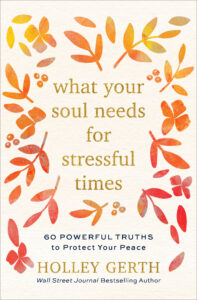A New Way to Set Goals—with Grace, Not Perfectionism
It’s not too late to set goals, no matter what part of the year we’re in. Think progress not perfection.
True confession: I’ve never been a fan of goals. When I worked in the corporate world, I remember sitting in an enthusiastic quarterly meeting. Someone put a slide on a screen with a list of numbers and percentages. At break time, a coworker walked up to me and pointed a finger in my face, grinning. “I saw you shake your head when that manager said, ‘What we measure gets better!’” Oops.
What finally got me to start setting goals was realizing my default goal is 100 percent. If I don’t set any goals at all, then my goal is always perfection. If you’re wired the same way, you may actually need goals to put less pressure on yourself. What if we can do goals differently? What if they could help us not be so hard on ourselves?

Getting Realistic
My change in heart regarding goals also came from working with coaching clients. They would tell me of some idealistic goal they had like “I want to run a marathon in three weeks!” I would say, “I think the desire to be more active is great! Now what’s the minimum that will make you feel like you’re making progress?” The response would be something like “I could take a walk three evenings a week.”
Here’s the magic of identifying a minimum: it starts to build momentum. Imagine I had two clients, one who insisted on the three-week marathon goal and the other who started with the minimum. If someone asked me to bet (don’t worry, I don’t bet) on which one would actually run a marathon one day, I’d choose the walker every single time.
For myself and my clients, I’ve started looking at goals differently. We come up with not one goal but three: a minimum, medium, and maximum. For example, walking three nights a week is a minimum, adding one day of running is medium, and running four days a week is a maximum.
What We Must Consider When We Set Goals
When we set goals, we often act as if they’re going to happen in isolation from the rest of our lives. We think of what we could do if we had no other challenges or responsibilities. But that’s not how it works. When we set goals, we need to consider one additional factor—our current level of life stressors. Then we match our goal level with our life-stressor level.
For example, if we’re in a season where we have extra free time and fewer responsibilities than usual, then we have minimum stress and could go for the maximum goal level. If our schedule is full and our responsibilities heightened, then that’s maximum stress and pairs best with a minimum goal level.
Traditional systems of goal setting can feel rigid. And we all know life is not rigid. It requires us to continually adapt, shift, change, grow, slow down, speed up, juggle, try again. So if we’re going to set goals, we need a method and perspective that work the same way.
God’s goal for our lives isn’t perfection; it’s growth and connection. Every effort counts. Every step matters. Every little bit of progress can be reason for rejoicing.
Reflection:
- Think of a goal in your life. Try adjusting it using the minimum, medium, maximum method, and consider your level of life stressors as you do.
- How can you give yourself grace and make room for mistakes this year? This year, let’s choose which things matter and not worry so much about everything else. If you make a mistake, commit to giving yourself grace and giving the situation to God.

Author bio: Holley Gerth (HolleyGerth.com) loves humans, words, and good coffee. She’s the Wall Street Journal bestselling author of many books, including The Powerful Purpose of Introverts and What Your Mind Needs for Anxious Moments. In addition to being a life coach and counselor with a master of science degree in mental health, Holley also cofounded the groundbreaking online community (in)courage and cohosts the More Than Small Talk podcast.
Want to learn more about managing stress and get your daily quiet time with God? Check out ~What Your Soul Needs for Stressful Times: 60 Powerful Truths to Protect Your Peace~ by Holley Gerth.







